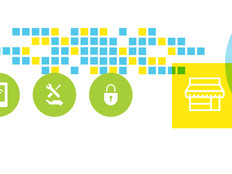Tech Tailored to Small Companies Is Focal Point of National Small Business Week
President Barack Obama has officially proclaimed this week National Small Business Week, which celebrates the contributions small business make to the American economy.
National Small Business Week, which started in 1963 and is hosted by the Small Business Administration (SBA), will include events across the country, from a symposium in Atlanta on starting your own business to an armchair discussion in Phoenix with veteran entrepreneurs on effective marketing and accessing capital. The week is designed to highlight a source of pride in this country: small businesses create nearly two-thirds of net new jobs each year nationwide — and employ more than half of all Americans.
According to a federal official focused on small businesses, those firms are clearly taking advantage of technology to spur growth and gain new customers, and will be courted specifically by tech companies with more frequency, especially as cloud services proliferate.
Yet, Douglas Kramer, deputy director of the SBA, noted in an interview with BizTech that despite the power of small businesses, “individually, they can’t muster that attention on their own.” With that in mind, National Small Business Week is designed to make the contributions of small businesses more concrete to a wider audience, he says.
The week also gives the SBA an opportunity to raise awareness of the “resources we offer to help make sure that it is a healthy environment for small businesses,” Kramer says. The agency offers numerous education resources to small businesses, and in the past few months has been promoting its Technology Coalition, in which small businesses are directed to services offered by large tech companies that are specifically tailored for small companies, including content management, file sharing, cloud services, legal solutions, online marketing and customer relationship management.
“We can’t endorse and promote products as the federal government, but we can help point people to where they can go to find resources,” Kramer says.
Catering to Small Business Tech Needs
Increasingly, small businesses are likely going to have software and hardware firms cater to their needs and develop products with small businesses in mind. That could include the kinds of applications and services that are offered on new PCs, or the kinds of protections that are offered via cloud services, Kramer suggests. The goal is to gain the trust and develop a relationship with small companies.
“I think that is only going to accelerate when you’re talking about cloud services,” Kramer says. “I think you are going to have more standardization. I think you’re going to have more functionality that cloud providers can put on and update when they provide their services.”
Cloud providers can offer enhanced protections and other service guarantees to small companies in order to solicit their business. Small firms may find that even if they need to pay a bit more, getting that guaranteed security or level of service might be worth the cost, Kramer says.
While Kramer says he does not know how often this happens in the IT market for small businesses, he’s confident that future partnerships will be forged. “I think there’s clearly a large enough market — and a large enough market that can grow considerably once you get in with them early as a provider — that my sense is the market, if it’s not already, will come to small businesses.”
Getting Educated on Cybersecurity
Kramer says that many small businesses face cybersecurity challenges but could overcome those obstacles if they availed themselves of educational resources provided by the SBA. However, he notes that many small business owners have numerous responsibilities and that cybersecurity can sometimes be an afterthought.
“I don’t think it takes a lot of time or it’s that difficult to set up, but when you’ve got a to-do list that’s 20 items long, until you get hit, it’s easy for cybersecurity to stay on the back burner,” Kramer says.
Kramer notes that phishing attacks in emails have become much more refined and sophisticated. “These aren’t Nigerian princes anymore,” he says. “These are the people you know saying things that sound like that person.”
“If we could just get small businesses to spend a day to pay attention to this issue, among everything else that they are trying to pull together, I think they would be able to do quite a lot with resources that are out there,” he says.
SBA has put information and resources on its website for cybersecurity, and Kramer says small businesses need to give this vital sector full attention before they are hit with an attack or intrusion.
“Because there are so many risks you have and so many things you could spend time with, but this is really one that small businesses should spend some time on,” he says.









